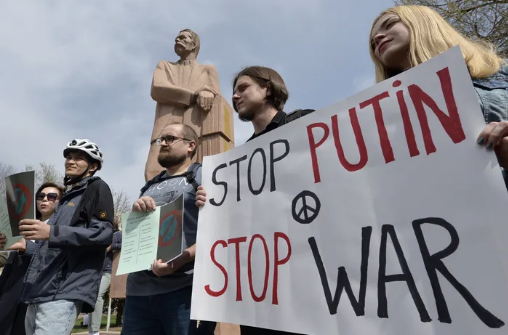
by Guangqing Chi and Erin Hofmann, For The Inquirer
The past three years haven’t been easy for Central Asian migrant workers in Russia like Murat and Aigul, a Kyrgyz couple who have worked in Moscow since 2018. In 2020, due to the pandemic lockdown in Moscow, the couple was confined for more than a month to a three-room apartment that they shared with eight other couples, all fellow migrants from their home country of Kyrgyzstan. The 18 adults shared a single kitchen and bathroom.
Neither Murat, a construction worker, nor Aigul, a cook, lost their jobs, but their salaries were slashed — by half — while the cost of living in Russia increased — jumping 14% in just one week after the country invaded Ukraine. They were able to make ends meet in Moscow, but they had to stop sending money home to support their three young daughters. So nearly two months into the war, with no sign that things would improve, Murat and Aigul returned to their home village in Kyrgyzstan. Consequences of the ongoing Russia-Ukraine war have been felt worldwide, in the form of skyrocketing prices for gas, food, and other necessities. Of course, the primary victims of the war have been Ukrainians, whether they stay or flee to other parts of Europe or the U.S., and international humanitarian and governmental assistance have been focused on those refugees.
However, there is another group that has been largely ignored: the labor migrants in Russia. We are sociologists who study labor migration from Central Asia, and recently met Murat and Aigul on a trip to Kyrgyzstan. After interviewing them and other migrants who had just returned from Russia, we believe that returning migrants are also on the brink of a crisis and they need humanitarian support. Before the war, there were an estimated 4.5 million labor migrants in Russia. Most of them were from Central Asia, including close to one million Kyrgyzs, 1.2 million Tajiks, and 2.1 million Uzbeks. And while these migrants have made significant contributions to Russia’s economy, their families and countries also have benefited tremendously from migration.
Remittances, or the money that migrants send home, made up 31% of the GDP of Kyrgyzstan in 2020, for instance. Millions of families rely on this money to buy food, pay for medical bills, educate their children, and build or repair their houses.
The experience of labor migrants, even within a peaceful geopolitical and economic development environment, can be stressful. But the combination of the pandemic and the war has drastically turned up the heat. The Western countries’ sanctions have put Russia’s economy to a real test. Job opportunities have all but disappeared. And the inflation continues, as it does in the rest of the world. As a consequence, many migrants in Russia have gone home.
In 2019, migrant remittances helped reduce the poverty rate from 31% to 20% in Kyrgyzstan. This year, however, the World Bank predicted a 33% decline in remittances, which could help push the poverty rate back up to 38%.
Murat and Aigul used up most of their savings to buy expensive plane tickets home. Now, they are looking for ways to attain financial security in Kyrgyzstan. Aigul enrolled in a distance education program to become a primary school teacher but isn’t sure she’ll be able to keep paying tuition. Murat found a job in construction, but it’s in a city nearly 60 miles away; he relies on a combination of the bus and rides to get there.
The governments of Kyrgyzstan and other Central Asian states have few resources to cope with a substantial drop in remittances, much less with the return of potentially millions of migrants. Murat and Aigul have had no assistance from government or humanitarian agencies in rebuilding their lives in Kyrgyzstan. With scarce jobs, high inflation, and rising living expenses, conditions for returning migrants will only become more difficult.
Central Asia has experienced substantial political instability and violence over the last 30 years, making this humanitarian crisis particularly dangerous. The international community would do well to pay attention to the plight of Central Asian migrant workers before the economic situation becomes worse.
Guangqing Chi is a professor of rural sociology and demography at Penn State, SSRI cofunded faculty member, and PRI associate.
Erin Hofmann is an associate professor of sociology at Utah State University.